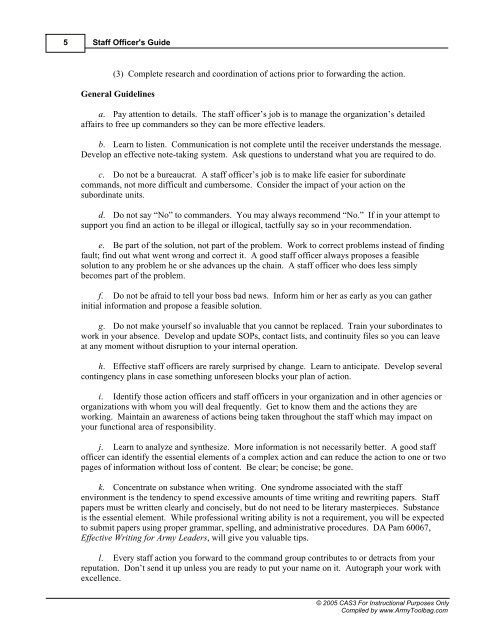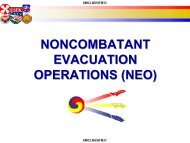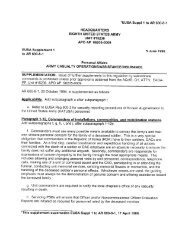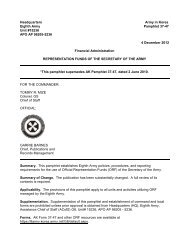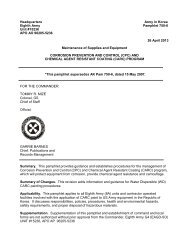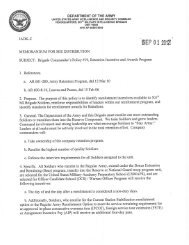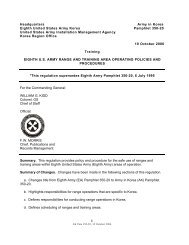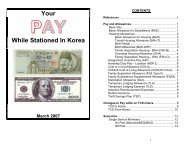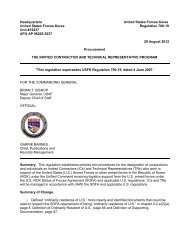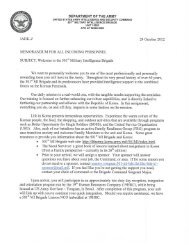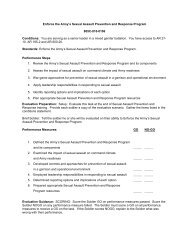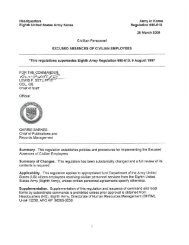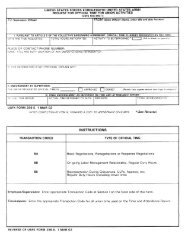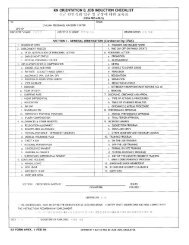CAS3 Staff Officer Guide - U.S. Army
CAS3 Staff Officer Guide - U.S. Army
CAS3 Staff Officer Guide - U.S. Army
Create successful ePaper yourself
Turn your PDF publications into a flip-book with our unique Google optimized e-Paper software.
5<br />
<strong>Staff</strong> <strong>Officer</strong>'s <strong>Guide</strong><br />
(3) Complete research and coordination of actions prior to forwarding the action.<br />
General <strong>Guide</strong>lines<br />
a. Pay attention to details. The staff officer’s job is to manage the organization’s detailed<br />
affairs to free up commanders so they can be more effective leaders.<br />
b. Learn to listen. Communication is not complete until the receiver understands the message.<br />
Develop an effective note-taking system. Ask questions to understand what you are required to do.<br />
c. Do not be a bureaucrat. A staff officer’s job is to make life easier for subordinate<br />
commands, not more difficult and cumbersome. Consider the impact of your action on the<br />
subordinate units.<br />
d. Do not say “No” to commanders. You may always recommend “No.” If in your attempt to<br />
support you find an action to be illegal or illogical, tactfully say so in your recommendation.<br />
e. Be part of the solution, not part of the problem. Work to correct problems instead of finding<br />
fault; find out what went wrong and correct it. A good staff officer always proposes a feasible<br />
solution to any problem he or she advances up the chain. A staff officer who does less simply<br />
becomes part of the problem.<br />
f. Do not be afraid to tell your boss bad news. Inform him or her as early as you can gather<br />
initial information and propose a feasible solution.<br />
g. Do not make yourself so invaluable that you cannot be replaced. Train your subordinates to<br />
work in your absence. Develop and update SOPs, contact lists, and continuity files so you can leave<br />
at any moment without disruption to your internal operation.<br />
h. Effective staff officers are rarely surprised by change. Learn to anticipate. Develop several<br />
contingency plans in case something unforeseen blocks your plan of action.<br />
i. Identify those action officers and staff officers in your organization and in other agencies or<br />
organizations with whom you will deal frequently. Get to know them and the actions they are<br />
working. Maintain an awareness of actions being taken throughout the staff which may impact on<br />
your functional area of responsibility.<br />
j. Learn to analyze and synthesize. More information is not necessarily better. A good staff<br />
officer can identify the essential elements of a complex action and can reduce the action to one or two<br />
pages of information without loss of content. Be clear; be concise; be gone.<br />
k. Concentrate on substance when writing. One syndrome associated with the staff<br />
environment is the tendency to spend excessive amounts of time writing and rewriting papers. <strong>Staff</strong><br />
papers must be written clearly and concisely, but do not need to be literary masterpieces. Substance<br />
is the essential element. While professional writing ability is not a requirement, you will be expected<br />
to submit papers using proper grammar, spelling, and administrative procedures. DA Pam 60067,<br />
Effective Writing for <strong>Army</strong> Leaders, will give you valuable tips.<br />
l. Every staff action you forward to the command group contributes to or detracts from your<br />
reputation. Don’t send it up unless you are ready to put your name on it. Autograph your work with<br />
excellence.<br />
© 2005 <strong>CAS3</strong> For Instructional Purposes Only<br />
Compiled by www.<strong>Army</strong>Toolbag.com


